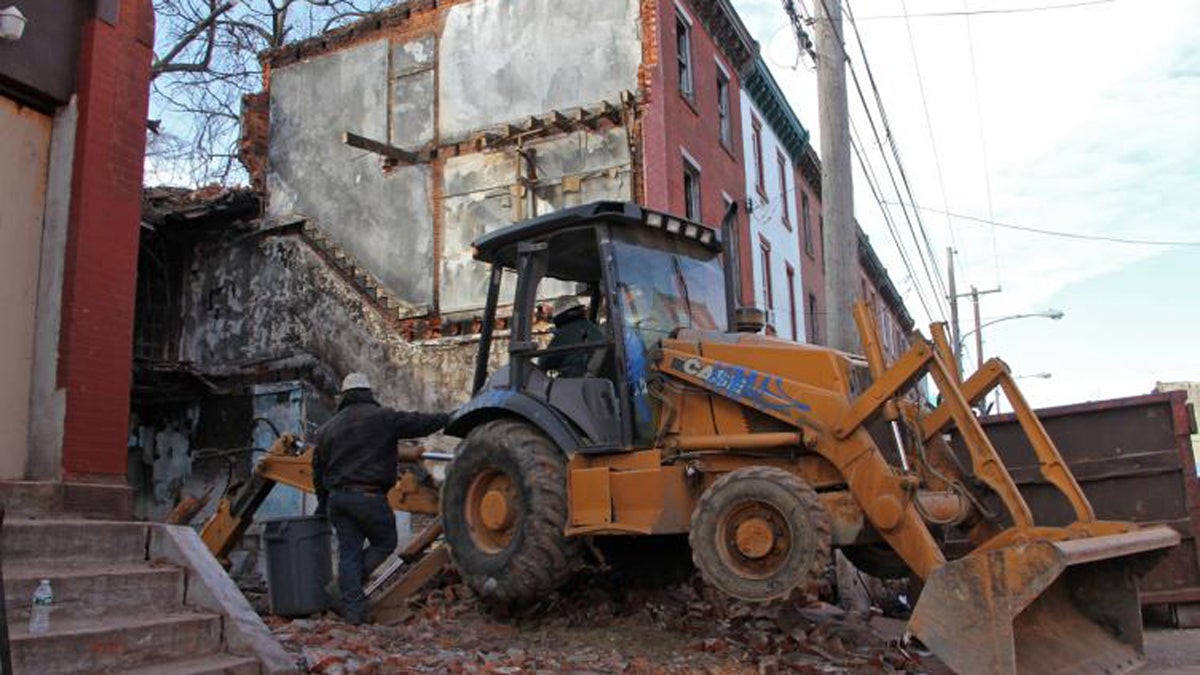In case you missed it: The week’s best reads from Pennsylvania cities

Workers demolish a North Philadelphia rowhouse. (Emma Lee/WHYY)
Changing cities, changing state.
Lead, cont.
We’ve been throwing a lot of lead information at you recently. So let’s take a step back. WPSU’s weekly talk show Take Note had Keystone Crossroads reporters on to talk through the big picture when it comes to lead. Then, we joined WESA’s Essential Pittsburgh to give you the highlights. And Dr. Loren Robinson from the Pennsylvania Department of Health answers your questions on WITF’s Smart Talk.
Thanks to the news out of Flint, most of the attention has been on lead in the water supply. And it turns out, Pennsylvania might have something to worry about. Pittsburgh’s water supply has been seeing increasing levels of lead since 1999 — it’s still within legal limits, but barely. Steelton residents have been warned about a chlorine byproduct called trihalomethane in the water. A roadside water stand in Berks County has been selling water with three times the legal limit of lead. And a columnist in Erie says the similarities between Flint and his city are too obvious to ignore.
Are you concerned about your water or lead poisoning? Please let us know about your experiences or any questions you have.
Work/Live
Remember the dark days of mid-2010, when unemployment was at 8.7 percent? Or the 1980s, when unemployment in some western Pennsylvania steel towns hit 27 percent? There’s good news: in January, unemployment was down to 4.7 percent, the lowest level since September 2007.
But improved employment numbers isn’t enough for many people on the bottom end of the pay scale. While more people have jobs than before, the number of working poor has also increased. The legislature hasn’t voted on proposals to raise the minimum wage beyond $7.25 an hour, set in 2007.
Governor Wolf supports raising the minimum wage. He sidestepped the legislature this week and raised the minimum wage for some state employees to $10.15 an hour. Not everyone loves the idea of an increase to the minimum wage, but non-union government employees left out of the pay raise say they’d really, really love the idea — if it had included them.
A job is just part of the equation. For many working poor families, missing a paycheck due to illness or family emergency can put them in danger of being evicted from their home. An eviction is a permanent black mark on any future housing applications and can leave families out in the cold.
But it’s a landlord’s right to evict tenants, whether for missed rent or because they want to do something else with the building. That’s what happened in Pittsburgh when the owners of Penn Plaza slipped 90-day eviction notices under the doors of all the tenants. Now, the city is working on finding a more humane way to ease people into new housing, particularly when an eviction is not their fault.
The city of Easton is having another eviction issue: the 40 or so homeless people who have gathered in an informal camp off Lehigh Drive. The city has shut down the camp, but there’s been pushback from campers with nowhere else to go and homeless shelters unprepared to deal with the influx.
Philadelphia is facing many of these issues as they prepare to “remake” the Sharswood neighborhood. The city has bought up a lot of private property using eminent domain and not everyone is happy with that plan. (Like the people currently living in those private properties.) Our friends at PlanPhilly are keeping an eye on that story as it develops.
If you’re not feeling blue yet, let me help: Little Buffalo State Park recently evicted 38 gnome homes. The park initially invited Steve Hoke, a local amateur artist, to place the homes throughout the park, but they were so popular, the park worried about the effect the crowds were having on the wildlife. There may be a happy ending to this fairy tale, though: Duncannon and Millersville, Pa. have both offered a new home for the gnome homes.
Pittsburgh, a changing city
We all know that Pittsburgh is a changing city, in a changing state (it’s sort of our favorite thing to talk about.) That narrative got some national attention this week when NPR came to town. Michel Martin hosted an event called Going There: Reinventing the American City, with local leaders and thinkers discussing what it means to be a “livable city” and who is missing out on city improvements.
You can go back and watch the whole event, or just catch the highlights. Martin also interviewed two generations of Pittsburghers about the way the city has changed in their eyes. Even if you’re not from Pittsburgh or western Pa., there are relatable parts of the discussion for the whole state, from Aliquippa to Altoona (and further east, too.)
Have a wonderful weekend and enjoy the spring preview we’re getting. If you go hiking, keep an eye out for gnome homes…at least 38 of them are newly on the housing market.
WHYY is your source for fact-based, in-depth journalism and information. As a nonprofit organization, we rely on financial support from readers like you. Please give today.


